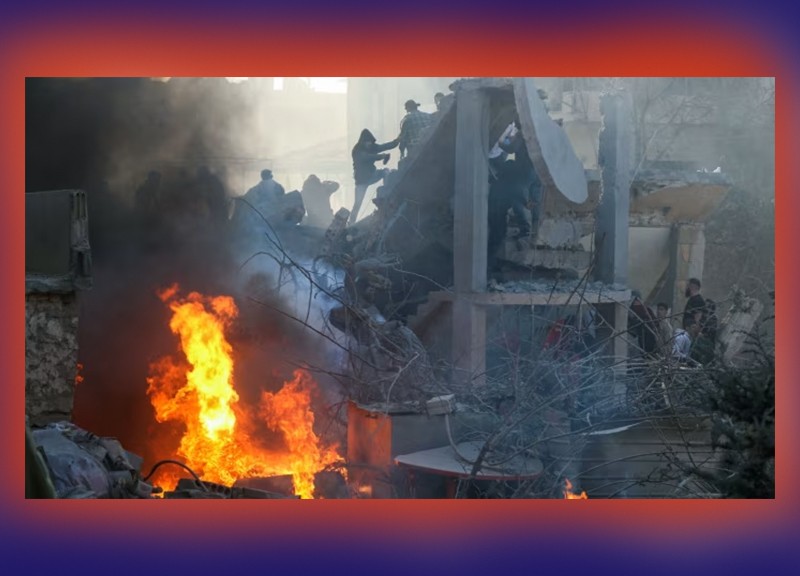
IDF chief says military considering ‘deepening’ of ground campaign against Hizbollah as air strikes intensify
Neri Zilber in Tel Aviv and Raya Jalabi in Beirut - FT.
Israel is drawing up plans to expand its ground offensive in southern Lebanon, the country’s top general said, as its warplanes intensified their air campaign against targets in the country.
Herzi Halevi, chief of staff of the Israel Defense Forces, said on Wednesday that Israel was “formulating . . . plans for the continuation of the fighting in Lebanon, including the expansion and deepening of the [ground] manoeuvre”. This would come alongside diplomatic efforts to end the war between Israel and the Lebanon-based Hizbollah militant group, he said.
The Israeli military also announced on Thursday that it was expanding its offensive in Gaza into the northern town of Beit Lahia, as heavy fighting continued between IDF forces and Hamas militants in the nearby Jabalia refugee camp.
The announcements came as the Middle East grapples with the potential implications of Donald Trump’s election victory in the US for the ongoing wars in Lebanon and Gaza, as well as the increasingly open confrontation between Israel and Iran.
The outgoing US administration of President Joe Biden has been attempting unsuccessfully for months to broker ceasefire deals to end the fighting in Gaza and Lebanon.
But while Biden still has more than two months left in office, Israeli officials, including Prime Minister Benjamin Netanyahu, have barely concealed their preference for Trump, viewing him as likely to be more supportive of their war aims.
“There’s an understanding between Netanyahu and Trump that they will work to end the wars,” a person familiar with Israel’s thinking said. “Netanyahu wants to help him reach that achievement. He didn’t guarantee it, but the notion is that he will wait with any kind of significant move in Lebanon or Gaza until January 20 [US inauguration day].”
Israel is also bracing for an Iranian attack following tit-for-tat strikes between the foes last month, with the Islamic republic threatening to retaliate after Israel struck Iranian military targets in an October 26 bombing raid.
Israeli officials have made clear they will not stop fighting Iran-backed Hizbollah even with ceasefire negotiations ongoing.
The IDF’s ground offensive, launched more than a month ago, has so far focused on a “first belt” of Lebanese border villages some 3km north of the frontier.
While Israeli military officials say their objective is to push Hizbollah militants back from the border region and eliminate the threat of cross-border invasion and fire, the bombing campaign across Lebanon has been more widespread.
Halevi said that Israeli forces continued to target Hizbollah “in the entire area — in southern Lebanon, the Bekaa [Valley], Beirut, and Syria”.
Israeli air strikes killed at least 40 people and wounded 53 more around the eastern Lebanese city of Baalbek in the Bekaa Valley on Wednesday, Lebanon’s health ministry said.
The Israeli military later said it had targeted nearly two dozen Hizbollah military sites, including missile launchers and weapons storage facilities, and that 60 militants had been killed.
Several powerful Israeli air strikes also hit Beirut’s southern suburbs overnight, after Israel issued an evacuation order for an area adjacent to Lebanon’s sole civilian airport. The Israeli military said it had targeted Hizbollah “command centres and terrorist infrastructure”, without giving additional details.
The stepped-up Israeli air campaign came hours after Hizbollah launched nearly a dozen rockets and missiles at northern and central Israel, with fragments landing inside the grounds of Ben Gurion Airport. No injuries were reported and the airport continued functioning after a short suspension of flights.
Later in the day, an IDF soldier was killed by a Hizbollah rocket strike in a northern border village, bringing the Israeli death toll in northern Israel and southern Lebanon to nearly 110 civilians and soldiers.
More than 3,000 people have been killed in Israeli strikes on Lebanon over the past year, the overwhelming majority in the past six weeks after Israel escalated its offensive.
Hizbollah began firing on Israel in the days after Hamas’s October 7 2023 attack from Gaza. The Palestinian enclave has since been shattered in the face of a ferocious Israeli military campaign.
The IDF said on Thursday it was expanding its Gaza campaign into Beit Lahia over indications of “the presence of terrorists and terrorist infrastructure”, and that it would facilitate the evacuation of civilians.
Much of northern Gaza lies in ruins, particularly following Israel’s renewed offensive launched early last month. Little humanitarian aid is able to enter, according to international aid groups, with much of the population forced to flee to Gaza City and further south.














